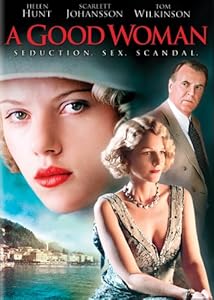
(This review originally appeared online in 2006 and was reposted on 3/4/13.)
When I first saw the trailer, I got the impression this was going to be an utterly serious drama about infidelity. So I was pretty surprised to find that A GOOD WOMAN (2004) is not only studiously droll, but it's based on Oscar Wilde's play "Lady Windermere's Fan."
I like Oscar Wilde because no matter what he wrote, almost every page has several quotable quips that are amusingly clever and insightful, or just amusingly snide. This movie has a good number of such lines, but I only recognized a few of them from the play itself, so scriptwriter Howard Himelstein must've either come up with them on his own or mined other Oscar Wilde works for them, or both.
"Some women bring happiness wherever they go. Others--whenever they go."
The latter is certainly true of Mrs. Erlynne (Helen Hunt), whose livelihood consists of leeching off of well-to-do married men until their wives finally get wise and start closing her bank accounts. Currently finding herself without such support, she hops an ocean liner to Italy in search of greener wallets and soon casts a predatory eye on the husband of young Lady Windermeyer (Scarlett Johansson), or "Meg" when she's at home.
Meg and Robert (Mark Umbers) have been married for only a year and are blissfully happy, which will soon change drastically after Mrs. Erlynne encounters Robert in a shop as he's picking out a gift for Meg's birthday. Mrs. Erlynne persuades him to buy her a fan, which will figure prominently in the plot later on, and then goes about sinking her claws into him.
"Marital bliss is a great burden to place on two people. Sometimes a third person is needed to lighten the load."
Before long, all the wealthy vacationers along the Italian coast are abuzz with gossip about Robert's numerous secret visits to "that wicked woman's" apartment, especially the dotty old Contessa Lucchino (Milena Vukotic). Not only is she Meg's friend, but her brother-in-law Tuppy (Tom Wilkinson, who played Carmine Falcone in BATMAN BEGINS and is very likable here) has fallen under Mrs. Erlynne's spell and is resolved to marry her despite her infamous reputation.
Meanwhile, the amorous and gleefully immoral Lord Darlington (Stephen Campbell Moore) has the hots for Meg and is circling around her seemingly doomed marriage like a vulture. And Meg, of course, eventually discovers what everyone else is already gossiping their heads off about and is devastated.
Up to that point, A GOOD WOMAN seems to be a rather dry attempt at comedy with an overly-realistic tone, and the fact that most of the characters go around spouting impossibly witty, though amusing, one-liners with every breath gives the dialogue an artificial quality. These jaded sophisticates just aren't farcical enough to rattle off epigrams like "sausages and women--if you want to enjoy the experience, never watch the preparation of either" or "I like America...name me another society that's gone from barbarism to decadence without bothering to create a civilization in between" off the top of their heads. That sort of thing plays okay in a broader comedy, especially if it's being performed onstage and set in an earlier era. But against the backdrop of the Italian coast in 1930, with the realistic atmosphere and period detail of a film like THE GREAT GATSBY, it seems almost surreal.
And when Meg happens to look through her husband's checkbook and finds that he's been paying large sums of money to Mrs. Erlynne all along (the final tip-off that he's cheating on her), the movie takes a somewhat jarring turn into the utter seriousness that the trailer seemed to suggest. Director Mike Barker even gives us a shot in which an overhead camera pulls slowly away from Meg as she sits at the desk, heartbroken. Later, on Lord Darlington's yacht after Meg has made the agonizing decision to leave Robert and run away with her foppish admirer, a final showdown between Meg and Mrs. Erlynne is painfully melodramatic, almost soap-operatic. There's even a "you're hurting me!" thrown in for good measure (I thought Frank Drebin was the only person who could still say that with a straight face).
So, curious as to just how far the tone of A GOOD WOMAN had strayed from the play on which it is based, I resolved to actually read "Lady Windermere's Fan." To my surprise, the original play isn't the lighthearted farce I expected it to be. There are a lot of great comedy lines and funny situations, to be sure, but there's also a good deal of straight-faced drama. Although the movie takes enormous liberties with the play, the most important scenes--Meg's birthday party being disrupted by the arrival of Mrs. Erlynne, their confrontation at Lord Darlington's, and the final resolution--are represented well enough to remain more or less true to the tone of the play.
"We are all in the gutter, but some of us are looking at the stars."
The best part of the movie, in fact, is its handling of the play's final act, in which Mrs. Erlynne pays a last, highly-emotional visit to the Windermere home and finds redemption. Earlier on, there's a huge plot twist that I'm not even going to hint to you about, and the way it and everything else is resolved in the end is very satisfying, right up to a final surprise just before the fade-out that actually put a smile on my face. So, while I had mixed feelings about the rest of A GOOD WOMAN, the fact that I felt pretty good about it when it was over compels me to cut it considerable slack.


No comments:
Post a Comment